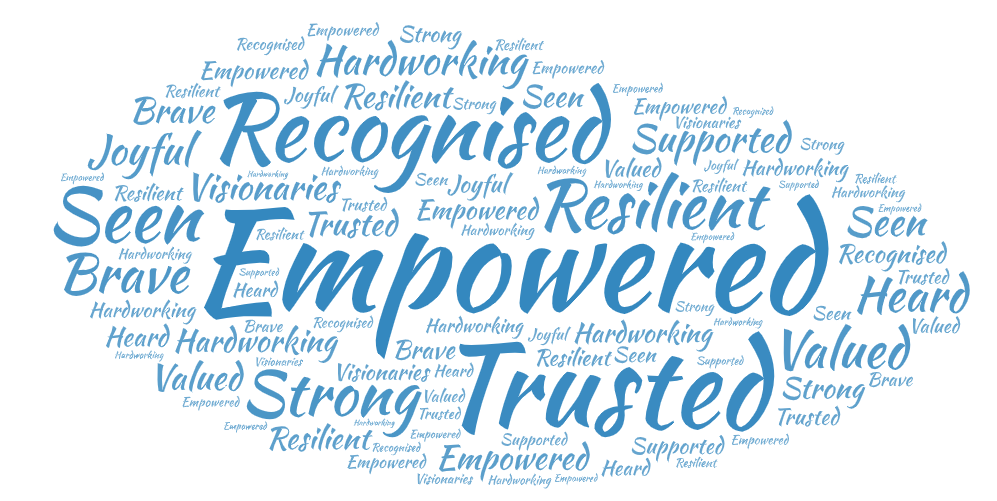On 8 March 2023, Vanguard Economics (VE) celebrated International Women’s Day. For a week, we celebrated the ‘Women of VE’, and amplified the UN Women’s global campaign, “DigitALL: Innovation and technology for gender equality” which seeks to advance women’s access to the digital world, and highlight their disproportionate experience of it.
As part of our celebrations, I had the privilege of interviewing 6 employees about their experiences as women; women living in Rwanda and women working at VE. They were asked a number of questions and the resounding points made were about the importance of being seen, valued and empowered.
Throughout this piece, I’ll share quotes from my conversations with Aline, Isabelle, Lydia, Sarah, Solange and Yvonne as they discussed womanhood, work, gender equality, and the digital world.
When concluding their interviews, Aline, Isabelle, Lydia, Sarah, Solange and Yvonne were asked to state a favourite song that celebrates women, and mention one woman whose work inspired them.
Woman by Juliana Kanyomozi was a firm favourite – the opening line, “We don’t know how she always finds a way” chiming well with the list of women whose work they found inspiration in; Rose Kabuye, Louise Mushikiwabo, Oprah, Rihanna.
All the women mentioned are titans of the political sphere, global entertainment industry, pillars of society, and trailblazers; which is fitting as this is how I’d describe women in Rwanda.
What 3 words would you use to describe being a woman; a woman in Rwanda?
Recognised, Empowered, Trusted, Resilient, Strong, Hardworking, Visionaries, Joyful, Heard, Hardworking, Valued, Brave, Supported, Seen, Hardworking.
These are the words used by Aline, Isabelle, Lydia, Sarah, Solange and Yvonne to describe being a woman in Rwanda. There was a resounding understanding that women living in Rwanda are valued; and that the evidence of this is apparent in every facet of society, be it their positions at Vanguard Economics, in Rwanda’s parliament and cabinet, or Rwanda’s continued commitment to education of the girl child, & eradicating gender based violence.
Tell me about your work at VE; How have you found your experience of working here?
When asked about working at Vanguard Economics, Lydia, Solange, and Aline spoke of the environment created by Vanguard Economics that encourages one to thrive and grow within their role. This environment is supported by the organisation’s core values, the foundation of its workplace culture; constant learning, everybody is a leader, humans first, excellence, and integrity.
Lydia – “Straight out of school, it was challenging but help is always present. Constant learning is valued, & you are encouraged to speak-up which builds your confidence.”
Solange – “VE is a great place to learn; my opinions are valued & my ideas are heard.”
Aline – “It is a good environment to learn. I started as an enumerator; I have been empowered, provided with new skills, & given the opportunity to create solutions that have impact.”
Why is it important to have gender equality in the workplace, and what does this look like to you?
According to UN Women Africa, Rwanda stands out globally for its efforts in advancing gender equality and women’s empowerment; particularly in political participation. Nearly two thirds of its parliamentary seats, and 52 per cent of cabinet positions are held by women, and in the 2020 Global Gender Gap Report, Rwanda ranked among the top 10 countries to have narrowed the gender gap.
UN Women Africa attributes Rwanda’s impressive results to its strong political commitment, and the presence of institutional level accountability. This is present at Vanguard Economics with women accounting for 52% of employees and women occupying 42% of managerial positions.
Yvonne, Sarah and Isabelle spoke about gender equality in the workplace, what it looks like, and why it is important.
Yvonne – “Gender equality is access to opportunities regardless of gender. It helps to maximise potential, & encourage women to be the best versions of themselves.”
Sarah – “The presence of women in positions of influence, such as on senior management teams, provides a safe space, and you feel like you can do it too.”
Isabelle – “Gender equality is important because lack of equality means missing out on women’s potential and impact.”
The UN Women’s theme for 2023 is DigitALL: Innovation and technology for gender equality. This 8 March, UN Women are calling on governments, activists and the private sector alike to power on in their efforts to make the digital world safer, more inclusive and more equitable.
What are your thoughts on women’s experience of the digital world; access to it, opportunities attained through it, & treatment in it? How do you think this could be improved?
UN Women Africa reports Rwanda three commitments to bridging the gender digital divide by 2020, and its involvement in the Action Coalition; Technology and Innovation for Gender Equality, and commitment to closing the digital gender divide by 2026.
When discussing the UN Women’s theme for 2023, ‘DigitALL: Innovation and technology for gender equality’, Yvonne, Solange, and Lydia spoke about the role of the digital world in the economic advancement of women, and also highlighted women’s disproportionate experience of harassment on digital platforms, as well as unequal access to digital infrastructure.
Lydia – “The digital world is an opportunity for women. With access, they have access to the world.”
Solange – “There has been an increase in uptake amongst women as seen in the rise of content creators, women-led businesses on social media; however women are still risk averse due to negative experiences such as harassment.”
Yvonne – “I think that women; particularly those in rural areas, have limited access to digital devices and infrastructure… Affordability and availability of tech and training on its usage is key to improving access.”
Lydia – “There is a natural bias towards women taking up new innovations; this affects women’s involvement in the digital space… I think that there should be policies deterring online bias against women, and training and access to digital infrastructure.”
Written and Edited by Yvonne Mwiza

